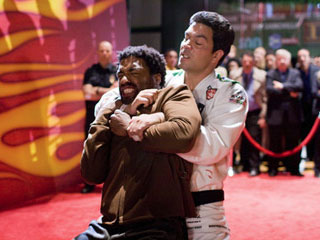Redbelt
by George Sax
Martial Arts-Mamet
Last weekend, readers of the New York Times sports section might have noticed an ad for Redbelt, David Mamet’s new movie. This isn’t the first time movie marketing has involved hawking a movie to sports fans, but it’s surely a first for famous playwright-turned-filmmaker Mamet.
Watch the trailer for "Redbelt"
The tie-in is the martial arts theme and setting of the movie. And if the readership of sports news is still disproportionally male, the linkage is even stronger. I can’t be certain, of course, but I’ve always suspected that Mamet’s work, particularly the plays, appeals more to males than females, particularly those men with a level of ambivalence about conventional masculinity and an anxiety about sustaining it. Mamet is, in this sense, a “man’s writer,” although by no means in a straightforward, pulp-literature way.
He works in a more elevated, stylized fashion—kind of Americanized Harold Pinter. His dialogue, when it isn’t exploding in sharp, often obscene, but hardly cathartic outbursts, is marked by a clipped obscurantism, and over-looming silences. And a kind of hardboiled posturing.
Redbelt (the name refers to a jujitsu master’s status) has some of these tendencies, but, perhaps surprisingly, it doesn’t succumb to them. Of the 10 films Mamet has directed, Redbelt is probably the best. It’s a measure of its success that it will probably appeal both to devotees of what Mamet calls “fight films” and an ostensibly more high-minded audience. It’s a refined B-movie, but not so refined that it lacks the excitements and satisfactions of good genre cinema. Both kinds of audiences will probably respond to the well-observed sense of milieu, the gradually developed tension, and the almost preternaturally courageous and principled hero.

At the center of Redbelt is Mike (Chiwetel Ejiofor), an LA martial arts instructor whose teaching emphasizes the need for emotional control and transcendence. “The hands are not the issue; the fight is the issue,” he intones, Yoda-like, at one juncture. You may regard this kind of thing as amusingly Delphic moonshine or trenchantly prophetic, but either way, it works for the movie’s creation of Mike and his world.
He does seem a little detached from more practical concerns, like paying the rent for his storefront academy, as his businesslike wife (Alice Braga) tries to impress upon him. This disjunction of spirit and vulgar necessity becomes more pronounced because of an incident involving a cop’s gun, a strung-out, distraught lawyer (Emily Mortimer) and a plate glass window. This plot setup isn’t among the more inspired devices in the annals of dark, noirish plotting, but it serves Mamet’s purposes by allowing him to embroider Mike’s fate.
Among the questionable people he encounters, and who begin to destroy his confined but largely contented existence, are a boozy, cynical film star (Tim Allen), an initially friendly-seeming but treacherous film producer (Joe Montegna), and a promoter of dubious martial arts contests (Ricky Jay).
In her review of Redbelt last week, the Times’ Manohla Dargis observed that Mamet is operating in accord with his understanding of Aristotle’s supposed dictum that action trumps character in tragedy. Forgetting the incongruity of assessing a movie like this as tragedy, she missed a more relevant Aristotelean tenet: Tragic heroes are larger than life.
It’s unlikely that Redbelt would be as satisfactory as it is if Ejiofor hadn’t invested Mike with a vaguely mythic, plausibly unconquerable integrity. There must be precious few actors who could do this. Ejiofor isn’t so much an underrated actor as an often overlooked one, but he’s strikingly effective in this role. That Mamet hasn’t given him a great deal to work with—as a screenwriter, Mamet doesn’t think much of back story—makes his performance more impressive. He has largely escaped the trap of pulpy caricature.
Another of the surprises the movie reveals is that Mamet has become a graceful, restrained and even fluid director. And Mamet, as writer, has kept his stylistic tropes and tricks to a minimum. There’s attitude in Redbelt, but not a lot of the minimalistic posturing one associates with much of his work.
It’s as if Mamet has been affected by his main character’s outsized integrity and modesty.
More Movie Reviews & Trailers
blog comments powered by Disqus
|
Issue Navigation> Issue Index > v7n19: Blockheads (5/8/08) > Film Reviews > Redbelt This Week's Issue • Artvoice Daily • Artvoice TV • Events Calendar • Classifieds |









 Current Issue
Current Issue